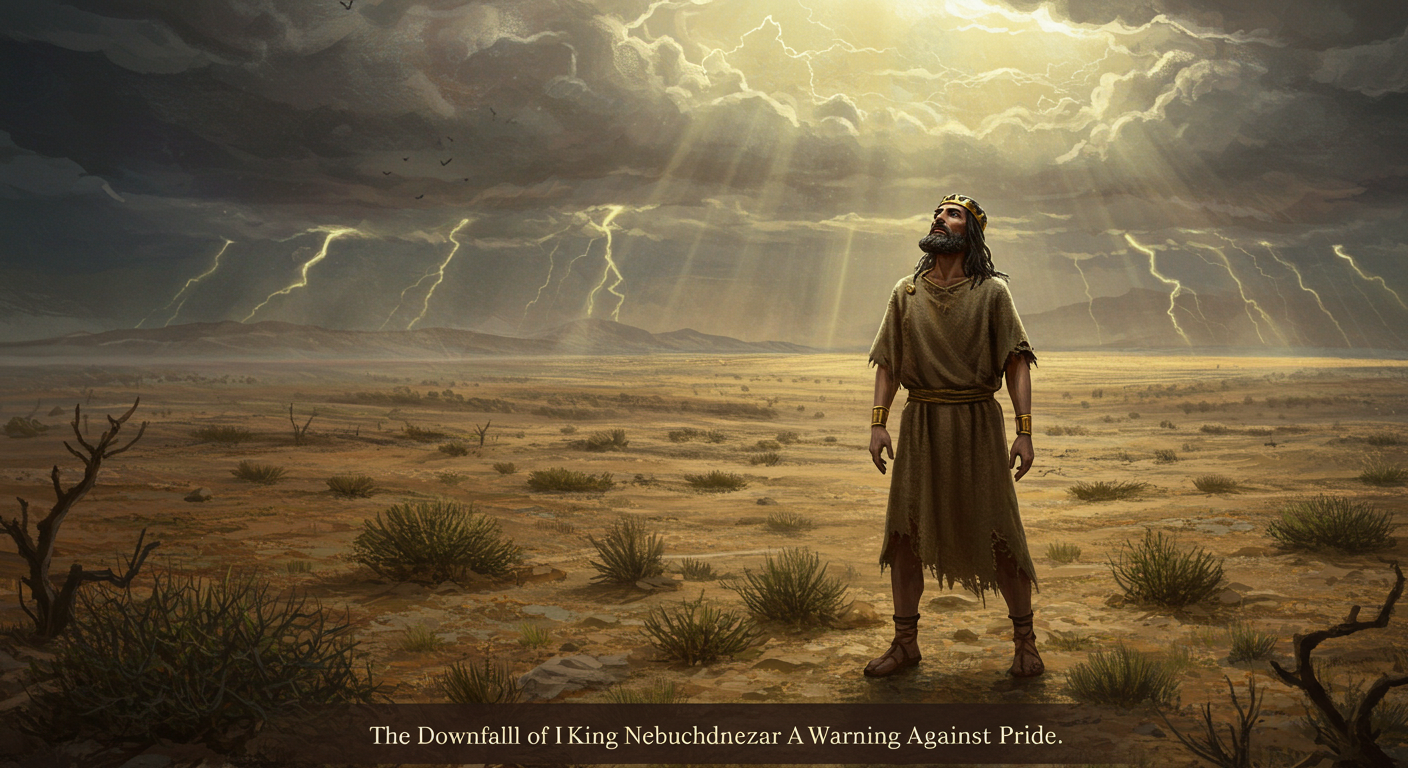The Downfall of King Nebuchadnezzar: A Warning Against Pride
Hello there! Today, let’s journey through the captivating story of King Nebuchadnezzar. This tale from the pages of the Old Testament is not just historical; it’s educational. It serves as a potent narrative about the perils of pride in the Bible. So, pour yourself a cup of coffee, make yourself comfortable, and let’s dive into a lesson that transcends time.
Understanding King Nebuchadnezzar
Who was King Nebuchadnezzar, you ask? He wasn’t just any ordinary king. Nebuchadnezzar II was the ruler of Babylon during its most glorious period. Imagine a city filled with architectural marvels, bustling markets, and walls so wide that two chariots could pass each other on top of them. Sounds like something out of a movie, right? But amidst all this grandeur, one thing was growing unchecked—Nebuchadnezzar’s pride.
Rise to Power
Nebuchadnezzar’s rise to power is noteworthy. He was the son of Nabopolassar, the king who overthrew the Assyrian Empire. In 605 B.C., Nebuchadnezzar took the reins and continued to expand his empire with unmatched vigor. Babylon wasn’t just geographically vast; it was culturally rich. Under his reign, it became a center for the arts and sciences—a beacon of innovation in the ancient world. The Hanging Gardens, one of the Seven Wonders of the Ancient World, were attributed to his reign, a symbol of his grandeur.
You might wonder, with all this evident power and wealth, what went wrong? How did a king with so much end up losing it all? Here, dear reader, lies the critical lesson about pride in the Bible.

The Root of Nebuchadnezzar’s Pride
Imagine waking up each day and surveying a kingdom that you built from the ground up. The temptation to feel invincible must have been immense. The success reached Nebuchadnezzar’s head. He looked at all he had accomplished and saw it as his own doing. He underestimated the power that was higher than his—the power of God. And that’s where things began to unravel.
Signs of Pride
Pride is like that ivy that slowly creeps up a wall, almost unnoticeable until it covers everything. Nebuchadnezzar’s pride manifested in various ways. He believed the success of Babylon was solely his doing. Forgetting his own human limitations, he failed to acknowledge the divine power behind the curtains. This pride isn’t just ancient history. It’s something you and I can fall prey to, which makes Nebuchadnezzar’s story so relatable.
In the Bible, there’s a moment that crystallizes this pride. In the book of Daniel, we see Nebuchadnezzar walking on the roof of his palace, admiring the glory of Babylon. He exclaimed, “Is not this the great Babylon I have built as the royal residence, by my mighty power and for the glory of my majesty?” His words are captured in Daniel 4:30. This epitomizes pride in the Bible—taking credit for achievements without recognizing the divine aid behind them.
Nebuchadnezzar’s Dream: A Forewarning
It wasn’t like Nebuchadnezzar wasn’t warned. In the comfort of his grandeur, he was visited by dreams, mysterious and perplexing. These were more than just dreams; they were divine messages. Daniel, a captive from Judah, became the interpreter of these dreams—God’s messenger to the king.
The Dream of the Great Tree
One such dream was of a massive tree, visible to the ends of the earth. Its leaves were beautiful, its fruit abundant, and it provided shelter to animals and shade to all creatures. But then came the shocking command: to cut down the tree and strip its leaves, leaving only the stump bound with iron and bronze. This wasn’t merely a dream about deforestation—it was prophetic. You see, this tree symbolized Nebuchadnezzar and the impending consequences of his pride.
Enter Daniel, who interpreted the dream. He explained that Nebuchadnezzar would be driven away from people to live among wild animals until he recognized God’s sovereignty over kingdoms and people. You can read about this in Daniel 4:15-17. This message was clear: pride in the Bible would be humbled by divine power.
The Fulfillment of the Prophecy
Often, we like to think that warnings are just minor setbacks. King Nebuchadnezzar probably thought the same. Despite Daniel’s interpretation, his pride continued to flourish. The king didn’t heed the warning, and God’s message took on a full-fledged reality.
Nebuchadnezzar’s Humbling
Twelve months later, the prophecy was fulfilled. As the king exalted himself from the rooftop of his palace, a voice came from heaven, stripping him of his kingdom. Can you imagine the scene? One moment a king; the next, just a man. Nebuchadnezzar was driven away and lived with wild animals, eating grass like cattle. His story beautifully illustrates pride in the Bible, showing how it precedes the fall. The full account of this humbling transformation can be found in Daniel 4:31-33.
Lessons for Us
Perhaps, you’re wondering why this ancient tale matters today. The truth is, pride has a persistent way of sneaking into the modern world as well. Nebuchadnezzar’s downfall teaches us—yes, you and I—that everything we have is a gift. Our talents, opportunities, and successes aren’t solely our own doing. They are parts of a bigger narrative, orchestrated by a higher power.
In moments where you’re tempted to boost your pride, remember Nebuchadnezzar’s story. His empirical prowess could not save him from the consequences of a prideful heart. So next time you find yourself basking in glory, try giving credit where it’s due.
Restoration and Redemption
What’s refreshing about Nebuchadnezzar’s story is that it doesn’t end in despair. After learning his lesson, the king was restored both mentally and spiritually. In humility, he acknowledged the one true King, speaking words of worship and gratitude.
Nebuchadnezzar’s Praise
Once he recognized God’s dominion, his sanity and kingdom were restored. This fulfilling moment teaches that no situation is too far gone for redemption. When Nebuchadnezzar came to terms with his pride, his life was transformed. He praises God in Daniel 4:34-37, acknowledging His eternal reign and justice. It’s a divine exchange, swapping pride for peace.
A Hopeful Reminder
We’ve all been there, haven’t we? Times when our accomplishments make us feel like we’re on top of the world. It’s essential to understand that true greatness comes from recognizing our dependence on something greater. Nebuchadnezzar’s life vividly shows how humility triumphs over pride in the Bible, presenting a hopeful squint at redemption available to everyone.
The Broader Biblical Perspective on Pride
King Nebuchadnezzar isn’t an isolated case. Pride is a recurring theme throughout the stories and teachings of the Bible. It’s a spiritual state that precedes downfall, but more importantly, offers a clear pathway towards grace and transformation when recognized and dealt with.
Pride’s Place in Biblical Lessons
Consider other biblical figures where pride led to complications: Lucifer’s fall from heaven, King Saul’s loss of favor, and even Peter’s initial bravado before denying Jesus. Each story underscores a fundamental biblical truth: pride can often lead us astray, while humility brings us back home. The consistent message about pride in the Bible is deeply woven into the lessons meant to guide personal and community ethics and spiritual growth.
The Role of Humility
Humility isn’t just an antidote to pride; it’s a spiritual virtue that opens the door to growth, service, and understanding. The Bible often equates humility with wisdom, showing it as a strength rather than a weakness. By consciously adopting humility, the believers find themselves more open to learning and adapting, vital in a world that’s constantly shifting and changing.
Practical Applications in Today’s World
So, let’s bridge the gap between the ancient world and our contemporary reality. How does the story of a Babylonian king hold relevance in your life today? Acknowledging pride is step one. But how do we apply this tale in our own lives, where pride can subtly slip in?
Recognition and Reflection
Just like Nebuchadnezzar, we have opportunities to examine our actions and decisions. Try to recognize moments where pride might be overshadowing your choices. Reflect questions: Are your achievements being shared with humility or boasted about? Are you acknowledging the role that others, or even divine intervention, might play in your success?
Seeking Balance
Striking a balance between self-worth and humility is key. Confidence is important, but should never veer into arrogance. Leaders, like Nebuchadnezzar, may find this particularly challenging, but it’s worth pursuing. Influence is strengthened through empathy, understanding, and humility—qualities that make leaders both respected and loved.
Engaging with Community
Engage in discussions and activities that emphasize attributes like service and community involvement. Being surrounded by individuals who value humility can keep you grounded. Church groups, volunteer organizations, or mentorship circles could be effective connections, where you share your journey and hear others’ insights.
Ending Thoughts: The Warning and Promise of Nebuchadnezzar’s Story
Nebuchadnezzar’s tale is a timeless warning against pride in the Bible but also a story filled with hope and restoration. It serves as a reminder that no one is immune to pride, regardless of their power or status. However, there’s always a way back, a chance to align our lives with humility rather than hubris. This journey from pride to humility isn’t just a biblical concept; it’s a prescription for a fulfilling human existence.
If this story resonates with you, perhaps it’s time to look inward and identify where pride might be lurking in your own life. Embrace the humility that leads to wisdom and deeper connections with those around you and your spirituality.
Explore More
For further reading and encouragement, check out these posts:
👉 7 Bible Verses About Faith in Hard Times
👉 Job’s Faith: What We Can Learn From His Trials
👉 How To Trust God When Everything Falls Apart
👉 Why God Allows Suffering – A Biblical Perspective
👉 Faith Over Fear: How To Stand Strong In Uncertain Seasons
👉 How To Encourage Someone Struggling With Their Faith
👉 5 Prayers for Strength When You’re Feeling Weak

📘 Jesus and the Woman Caught in Adultery – Grace and Mercy Over Judgement
A powerful retelling of John 8:1-11. This book brings to life the depth of forgiveness, mercy, and God’s unwavering love.
👉 Check it now on Amazon
As a ClickBank Affiliate, I earn from qualifying purchases.
Acknowledgment: All Bible verses referenced in this article were accessed via Bible Gateway (or Bible Hub).
“Want to explore more? Check out our latest post on Why Jesus? and discover the life-changing truth of the Gospel!”








